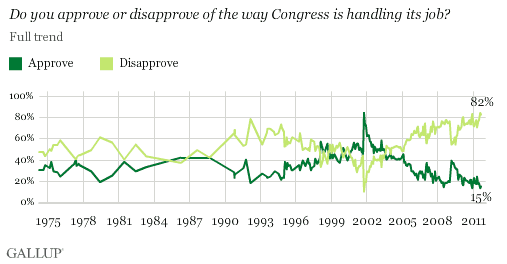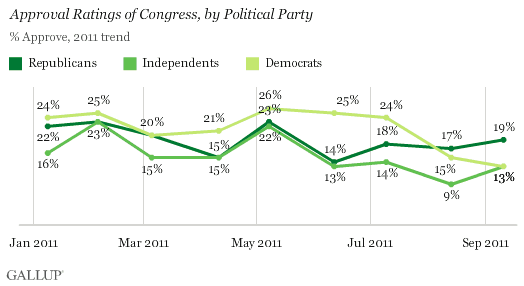PRINCETON, NJ -- Congressional job approval is now 15%, up slightly from the record-tying low of 13% recorded in August, while disapproval is 82%, compared with 84% last month.

These results are based on interviews conducted in a Sept. 8-11 Gallup poll, as President Barack Obama urged Congress to pass his newly announced major jobs plan legislation and amid news coverage of the 10th anniversary of the 9/11 terrorist attacks.
Gallup has recorded only three measures lower than this month's rating of 15%, although Americans have never responded very positively when asked to rate Congress. The average approval rating since Gallup first began asking Americans to rate Congress in 1974 is 34%. Congressional job approval has generally drifted downward since it reached 39% in March 2009, shortly after President Obama took office. The average congressional job approval rating for 2010 was 19%.
Last month's 13% approval tied the record low from December 2010. The highest congressional job approval rating measured by Gallup came in the aftermath of the 9/11 attacks, with a single reading of 84% in October 2001.
Americans are not very positive in their ratings of most things associated with the federal government these days. A recent update on Americans' images of 25 business and industry sectors found the federal government dead last on the list, with 17% of Americans saying their image of the federal government was positive and 63% saying it was negative.
A number of measures in the Sept. 8-11 poll -- to be reported in the days ahead -- also find the public's trust and confidence in the government and legislative branch to be very low, including the finding that 81% of Americans say they are dissatisfied with the way the nation is being governed.
Democrats' Approval of Congress Drops
Democrats have become less positive in their ratings of Congress in the last two months, from 24% approval in July to 15% in August to 13% this month. As a result, the relative partisan landscape has changed. Whereas Democrats gave Congress the highest approval ratings from April through July, Republicans are now the most positive, with Democrats and independents less so.
Rank-and-file Democrats may be downgrading their ratings of Congress because of their perceptions of the way in which the GOP-controlled House failed to work toward a compromise with Obama and Democratic leaders on the debt ceiling.

Implications
It is perhaps not surprising to find that most Americans continue to disapprove of the job being done by the men and women they elect to represent them in Congress, given that Americans' confidence in the economy and overall satisfaction with the way things are going in the U.S. are very low. The highly partisan and rancorous debate over raising the debt ceiling no doubt contributed to August's all-time-low congressional job approval rating; the only silver lining for Congress in the September update is that congressional approval has not fallen to a new all-time low.
Much is on Congress' plate at the moment, including consideration of a possible vote on parts of President Obama's jobs plan and the ongoing work of the congressional "supercommittee" attempting to find ways to cut the federal budget. The future trajectory of congressional job approval ratings may depend on how both of these work out, the direction of the economy, and whether or not Congress is seen in the months ahead as being able to negotiate and compromise rather than contentiously argue.
Survey Methods
Results for this Gallup poll are based on telephone interviews conducted Sept. 8-11, 2011, with a random sample of 1,017 adults, aged 18 and older, living in all 50 U.S. states and the District of Columbia.
For results based on the total sample of national adults, one can say with 95% confidence that the maximum margin of sampling error is ±4 percentage points.
Interviews are conducted with respondents on landline telephones and cellular phones, with interviews conducted in Spanish for respondents who are primarily Spanish-speaking. Each sample includes a minimum quota of 400 cell phone respondents and 600 landline respondents per 1,000 national adults, with additional minimum quotas among landline respondents for gender within region. Landline telephone numbers are chosen at random among listed telephone numbers. Cell phones numbers are selected using random digit dial methods. Landline respondents are chosen at random within each household on the basis of which member had the most recent birthday.
Samples are weighted by gender, age, race, Hispanic ethnicity, education, region, adults in the household, and phone status (cell phone-only/landline only/both, cell phone mostly, and having an unlisted landline number). Demographic weighting targets are based on the March 2010 Current Population Survey figures for the aged 18 and older non-institutionalized population living in U.S. telephone households. All reported margins of sampling error include the computed design effects for weighting and sample design.
In addition to sampling error, question wording and practical difficulties in conducting surveys can introduce error or bias into the findings of public opinion polls.
View methodology, full question results, and trend data.
For more details on Gallup's polling methodology, visit https://www.gallup.com/.
